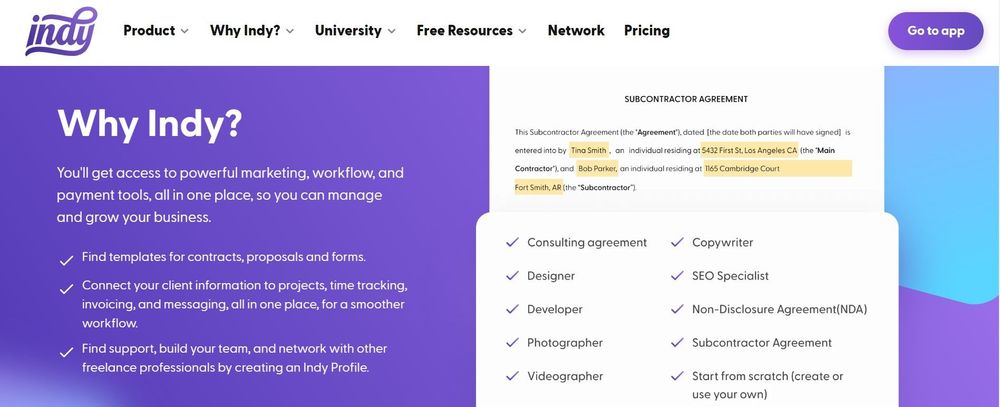Are you a freelancer looking to protect yourself and your work? If so, then having a service contract is essential. A service contract outlines the terms of an agreement between two parties and can help avoid any potential misunderstandings or disputes that may arise in the future.
In this article, we will provide an overview of what a service contract is, how to write one, and what should be included in your contract. We'll also discuss some tips on creating effective contracts that protect both you as the freelancer and your clients. With this knowledge, you'll be well-prepared to enter into new agreements with confidence.
What is a service contract?
A service contract is a legally binding agreement between two parties that outlines the services to be provided and the associated payment. It also specifies any other terms or conditions related to the service, such as a timeline for completion, confidentiality agreements, and more. A good service contract should cover all aspects of the transaction (including payment) in order to provide legal protection for both parties involved.
Additionally, it should clearly define each party's rights and responsibilities in order to prevent any misunderstandings from arising during or after the completion of the agreement. Service contracts can be used in a variety of scenarios, such as when hiring a freelancer for specific work or when entering into an outsourcing arrangement with another company.
In either case, having a well-drafted service contract is essential for protecting your interests and ensuring that all expectations are met throughout the duration of the agreement.

Benefits of having a service contract
Having a service contract in place for any agreement between two parties is essential for protecting both parties' interests. Not only does it provide legal protection, but it also clearly outlines the terms of an agreement and helps avoid misunderstandings or disputes that may arise during or after the completion of the services. In this section, we'll discuss some of the benefits that come with having a service contract in place.
Protect your legal rights: Ensure that both parties are covered
A service contract is a legally binding agreement that provides protection for both parties involved. It outlines the terms of an agreement, including payment details and confidentiality agreements, to help ensure that both parties understand their rights and responsibilities.
This helps avoid any potential misunderstandings or disputes that may arise during or after the completion of the services. Having a well-drafted service contract in place ensures that all expectations are clearly communicated from the beginning, so there won't be any surprises down the road.
Avoid misunderstandings and disputes by using a service contract
A service contract helps to avoid any potential misunderstandings or disputes that may arise during or after the completion of the services. It provides a clear document outlining the terms and conditions of an agreement, including payment details, timelines for completion, and confidentiality agreements. This allows both parties to understand their rights and responsibilities from the start and ensures that everyone is on the same page when it comes to expectations.
Clearly outlines the terms and conditions of an agreement
A service contract is essential for establishing mutual understanding and trust between two parties. Not only does it provide legal protection, but it also helps to ensure that all expectations are met throughout the duration of the agreement. It outlines the terms and conditions of an agreement in clear language, including payment details, timelines for completion, and confidentiality agreements.
Payment terms play a particularly important part when it comes to service contracts. They provide clarity on what each party expects to receive or pay for in exchange for services rendered or provided. Payment terms should clearly outline how much will be paid, when payments are due, whether payments are refundable or non-refundable, as well as any other relevant information such as late fees or interest rates applicable. Additionally, payment terms can also specify how long either party has to accept or reject a payment before taking action against one another.
Establishes each party's rights and responsibilities
A service contract can be especially helpful when it comes to dispute avoidance and resolution. It is important to thoroughly understand the rights and responsibilities of both parties involved in order to ensure that expectations are met throughout the duration of the agreement.
Dispute avoidance and resolution should not be taken lightly, as it can have a significant impact on both parties’ trust, relationships, and reputation. A service contract can help establish clarity around each party's rights and responsibilities, so everyone is aware of their obligations from the start.
Additionally, a service contract should provide an avenue for dispute resolution should one arise during or after the completion of services. This can include setting up an alternate dispute resolution, such as mediation or arbitration, where both parties agree to work with an independent third-party mediator to resolve any issues that may arise.
How to write a service contract
When it comes to writing a service contract, the most important thing to keep in mind is clarity. The document should be comprehensive and cover all aspects of the agreement in plain language that both parties understand. Here are some simple tips to remember when drafting a service contract:
- Be clear and concise: When drafting a service contract, it is important to make sure that the language used is clear and concise. All terms and conditions should be written in plain language that can be easily understood by both parties. Avoid any ambiguity or vagueness, as this could lead to disputes down the road.
- Include everything: When creating a service contract, it is important to include all the necessary clauses. This includes provisions outlining payment terms, such as when payments are due and any applicable late fees or interest rates. Additionally, timelines for completion should be outlined and agreed upon between both parties. It is also important to include details on dispute resolution, including setting up an alternate dispute resolution, such as mediation or arbitration with an independent third-party mediator in the event of any disagreements or misunderstandings. Confidentiality agreements should also be included in the contract to protect both parties’ rights and privacy. Finally, the contract should include a provision for termination should either party fail to abide by its terms and conditions.
- Store contracts carefully: The final tip for writing a service contract is about how you manage them after they are written. Use electronic signatures and cloud document storage for easy access, and keep a copy of the contract on file in case of any disputes or misunderstandings. This way, both parties will have evidence to back up their claims if needed.

Necessary information in a service contract
A service contract is a legal agreement between a service provider and a client that outlines the terms and conditions of the services being provided. In order to make sure that the contract is comprehensive and covers all necessary bases, it is important to include certain key pieces of information.
Some of the necessary information that should be included in a service contract includes:
- The parties involved: The contract should clearly identify the service provider and the client.
- The scope of the services: The contract should describe the specific services that will be provided, as well as any limitations or exclusions.
- The duration of the contract: The contract should specify the length of time the services will be provided, as well as any renewal or termination provisions.
- The payment terms: The contract should outline how the client will pay for the services, including the amount, frequency, and method of payment.
- Any warranties or guarantees: The contract should specify any warranties or guarantees that the service provider is offering, such as a guarantee of workmanship or a satisfaction guarantee.
Those are the basic things your contract should include. Now, let's look in more detail at some clauses that are a little more important.
Payment terms and conditions in the agreement
The payment terms and conditions in a service contract should outline how the client will pay for the services being provided. This includes the amount of the payment, the frequency of payment, and the method of payment.
Some other key points to consider when drafting the payment terms and conditions of a service contract include:
- Late payment fees: The contract should specify what will happen if the client fails to pay on time, such as the imposition of late fees or interest charges.
- Payment security: If the contract involves the exchange of sensitive financial information, such as credit card numbers, the contract should outline how this information will be kept secure.
- Payment disputes: The contract should specify a process for resolving disputes over payment, such as mediation or arbitration.
Getting paid is important and disputes around payment are some of the most common. So take the time to get your payment terms sorted properly.

Termination clause for services contracts
A termination clause is a provision in a service contract that outlines the circumstances under which the contract can be terminated by either party. This is important because it allows the parties to have some control over the duration of the contract and can provide a mechanism for resolving disputes or ending the relationship if necessary.
Some key points to consider when drafting a termination clause for a service contract include:
- Termination by either party: The contract should specify that either party can terminate the contract under certain circumstances, such as if the other party breaches the agreement or fails to meet certain obligations.
- Notice of termination: The contract should specify how much notice must be given before the contract can be terminated and whether this notice must be in writing.
- Effects of termination: The contract should outline what will happen after the contract is terminated, such as whether the client is entitled to a refund or if the service provider is entitled to payment for work already completed.
Knowing how to end a contract successfully is good for building a reputation. By clarifying your termination clause, you are creating a strong way to end contracts without burning bridges.
Confidentiality clauses in the agreement
A confidentiality clause, also known as a nondisclosure agreement (NDA), is a provision in a service contract that prohibits one or both parties from disclosing certain information to third parties. This can be especially important if the services being provided involve the exchange of sensitive or proprietary information.
Some key points to consider when drafting a confidentiality clause for a service contract include:
- The scope of the confidentiality obligations: The contract should specify what information is considered confidential and subject to the clause.
- Exclusions from confidentiality: The contract should outline any exceptions to the confidentiality obligations, such as information that is already known to the receiving party or information that becomes public through no fault of the receiving party.
- Duration of the confidentiality obligations: The contract should specify how long the confidentiality obligations will remain in effect, such as after the termination of the contract or for a specific period of time.
- Penalties for breach of confidentiality: The contract should specify the consequences for violating the confidentiality obligations, such as financial damages or the termination of the contract.
- Exceptions to the confidentiality obligations: The contract should outline any circumstances under which the confidentiality obligations do not apply, such as if the information must be disclosed to comply with a legal requirement or to protect the receiving party's rights.
It is important to note that confidentiality clauses can be complex and may need to be tailored to the specific needs and circumstances of the parties involved. It is always a good idea to consult with an attorney when drafting or reviewing a confidentiality clause in a service contract.
Indemnification provisions in the agreement
Indemnification provisions, also known as "hold harmless" clauses, are provisions in a service contract that require one party to compensate the other party for any losses or damages that may arise from the services being provided. These provisions can protect both the service provider and the client from certain types of liability.
Some key points to consider when drafting indemnification provisions for a service contract include:
- The scope of the indemnification: The contract should specify what types of losses or damages will be covered by the indemnification provisions.
- The party responsible for indemnification: The contract should specify which party will be responsible for indemnifying the other party.
- The limits of indemnification: The contract should specify any limits on the amount of indemnification that may be required, such as a maximum amount or a cap on damages.
- Notice and defense: The contract should specify that the party seeking indemnification must provide notice of any claim and cooperate in defense of the claim.
Some industries rely heavily on these clauses, while others almost never think of them. You may want to seek advice from an attorney or legal professional to understand what is best for your work.

Dispute resolution procedures for services contracts
Dispute resolution procedures are provisions in a service contract that specify how the parties will resolve any disputes that may arise from the services being provided. These procedures can help to ensure that conflicts are resolved quickly and efficiently without the need for expensive and time-consuming litigation.
Some key points to consider when drafting dispute resolution procedures for a service contract include:
- The type of dispute resolution process: The contract should specify the type of dispute resolution process that will be used, such as mediation, arbitration, or litigation.
- The selection of a neutral third party: The contract should specify who will select any neutral third-party mediator or arbitrator and what qualifications they must have.
- The procedures for dispute resolution: The contract should specify the procedures that will be used for the dispute resolution process, such as timelines for filing claims and deadlines for responding to claims.
- The costs of dispute resolution: The contract should specify who will bear the costs associated with the dispute resolution process, such as legal fees or arbitration fees.
These provisions can help protect both parties from costly and time-consuming litigation, so it is important to make sure they are included in any service contract. It is always a good idea to consult with an attorney when drafting or reviewing a dispute resolution provision in a service contract.
When do you need a service contract?
A service contract is a legally binding agreement that outlines the terms and conditions of a service being provided. It is generally necessary to use a service contract whenever a freelancer is providing a service to a client in order to protect both parties and ensure that there is a clear understanding of the expectations and obligations involved.
There are several things that might trigger a freelancer to use a service contract, including:
- The scope of the services is significant: If the services being provided are extensive or complex, a service contract can help to ensure that both parties have a clear understanding of the work that will be done and the expectations for how it will be done.
- The services are being provided to a new client: When working with a new client, a service contract can help to establish a professional relationship and set the terms and conditions of the engagement.
- The services involve the exchange of sensitive or proprietary information: If the services being provided involve the exchange of sensitive or proprietary information, a confidentiality clause (also known as a nondisclosure agreement) can help to protect this information and ensure that it is kept confidential.
- The services have a long-term duration: If the services being provided are expected to continue for an extended period of time, a service contract can help to establish the terms and conditions of the engagement and provide a mechanism for ending the relationship if necessary.
- The services have a significant financial value: If the services being provided have a significant financial value, a service contract can help to protect the interests of both parties and ensure that the payment terms and conditions are clearly defined.
To repeat, as a freelancer, you should probably use a service contract for all your work. However, most of us have small jobs or projects that we can complete without a contract. When one of these triggers occurs, though, it's a strong sign you should draft a proper contract.

Understanding the Service Contract Act
The McNamara-O’Hara Service Contract Act (SCA) is a US federal law that sets out the minimum wage and benefits requirements for contractors and subcontractors performing services on prime contracts. The SCA applies to contracts in excess of $2,500 and requires contractors to pay service employees in various classes no less than the prevailing wage rates and fringe benefits in the locality, or the rates contained in a predecessor contractor's collective bargaining agreement.
Here are the key points to note about the SCA:
- For contracts equal to or less than $2,500, contractors must pay the federal minimum wage as provided in the Fair Labor Standards Act.
- For prime contracts in excess of $100,000, contractors and subcontractors must pay laborers and mechanics at least 1.5 times their regular rate of pay for all hours worked over 40 in a workweek.
- The overtime provisions of the Fair Labor Standards Act may also apply to SCA-covered contracts.
In summary, the SCA is a federal law that establishes minimum wage and benefits requirements for contractors and subcontractors performing services on prime contracts in excess of $2,500 in the US. It is important for freelancers to be aware of the requirements of the SCA when entering into service contracts in order to ensure compliance with the law.
How Indy can help you with your service contracts
Indy is a service that provides an easy and flexible way for freelancers to create, send, and sign contracts. With Indy, freelancers can set up, sign, and send their contracts in just a few minutes, using either the templates provided or by copying and pasting their existing contract into the editor.

Here are some key benefits of using Indy for freelancers:
- Easy contract creation: Indy's contract management tool allows freelancers to set up and send contracts in just a few minutes.
- Customization options: Freelancers can use the templates provided for the quickest setup, or they can copy and paste their existing contract into the editor and send it out for signing. They can also choose from over 50 fonts to customize their contract.
- Electronic signature feature: Freelancers can use Indy's built-in electronic signature feature to sign their contracts, or they can upload their own signatures. Clients can easily sign online without the need for an Indy account.
- Contract tracking: Indy allows freelancers to monitor the current status of all their contracts in one list, from Draft to Viewed to Signed. Freelancers can also resend contracts if they need a signature from someone.
In summary, Indy is a useful tool for freelancers who need an easy and flexible way to create, send, and sign contracts. It provides a variety of templates and customization options, as well as an electronic signature feature and contract tracking capabilities.
Sample template for writing a services contract
Service contracts are similar to other freelancer contracts. Indy has a series of contract templates. You can view them, choose one that's close to what you need, and then customize it to fit your job and needs.

Conclusion
Service contracts are an important way for freelancers to protect themselves and ensure they receive payment for their work. Understanding the SCA is important when entering into service contracts, as is having a template that outlines the terms of the agreement in clear language.
Indy provides easy-to-use tools and templates to help freelancers quickly create, send, and sign service contracts with their clients. With Indy, you can be sure your contracts will be legally binding and compliant with applicable laws. Best of all? The basic features for Indy’s contracts tool are free to use.



